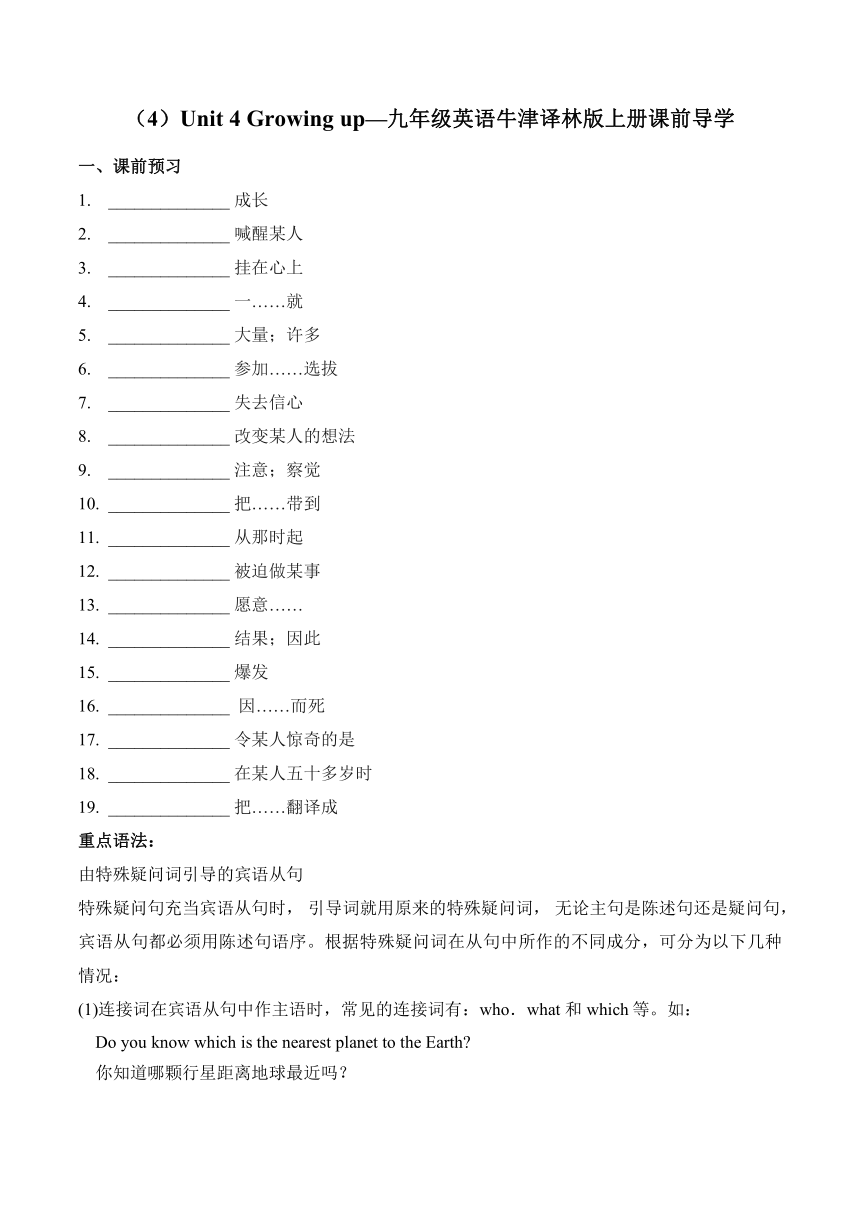Unit 4 Growing up(含解析)—九年级英语牛津译林版上册课前导学
文档属性
| 名称 | Unit 4 Growing up(含解析)—九年级英语牛津译林版上册课前导学 |  | |
| 格式 | docx | ||
| 文件大小 | 23.4KB | ||
| 资源类型 | 教案 | ||
| 版本资源 | 牛津译林版 | ||
| 科目 | 英语 | ||
| 更新时间 | 2024-08-17 10:26:58 | ||
图片预览


文档简介
(4)Unit 4 Growing up—九年级英语牛津译林版上册课前导学
课前预习
______________ 成长
______________ 喊醒某人
______________ 挂在心上
______________ 一……就
______________ 大量;许多
______________ 参加……选拔
______________ 失去信心
______________ 改变某人的想法
______________ 注意;察觉
______________ 把……带到
______________ 从那时起
______________ 被迫做某事
______________ 愿意……
______________ 结果;因此
______________ 爆发
______________ 因……而死
______________ 令某人惊奇的是
______________ 在某人五十多岁时
______________ 把……翻译成
重点语法:
由特殊疑问词引导的宾语从句
特殊疑问句充当宾语从句时, 引导词就用原来的特殊疑问词, 无论主句是陈述句还是疑问句,宾语从句都必须用陈述句语序。根据特殊疑问词在从句中所作的不同成分,可分为以下几种情况:
(1)连接词在宾语从句中作主语时,常见的连接词有:who.what 和 which等。如:
Do you know which is the nearest planet to the Earth
你知道哪颗行星距离地球最近吗?
(2)连接词在宾语从句中作宾语、状语或表语时,常见的连接词有:who(m),what,when 和 how 等。如:
We wondered who(m) her brother was waiting for.
我们想知道她的弟弟在等谁。
(3)连接词加名词在宾语从句中作宾语或表语,其中连接词作名词的定语。常见的连接词有:whose,what,which,how many和 how much等。如:
Please tell me how many students there are in your class
请告诉我你们班上有多少名学生。
注意:“What's wrong… ./What's the matter… /What's the trouble… ”充当宾语从句时语序不变;特殊疑问句中的特殊疑问词作主语时,语序不变。如:
I don't know. What's wrong with you (合并为一句)
I don't know what's wrong with you
He asked,“What's the matter with you ”(改为间接引语)
He asked what was the matter with me.
提出建议
我们可以 Why not….Why don't you…,What/How about…,Let's…和 Shall we…
礼貌地提出建议。
注意:各自的用法:
“Why not ”可以独立成句,也可以跟动词原形,意为“为什么不 (……)呢?”。
“Why don't you+动词原形?”意为“你为什么不……呢 ”。
“What/How about+名词/代词/动名词?”意为“……怎么样?” 。
“Let's+动词原形!”意为“咱们……吧!”。
“Shall we+动词原形?”意为“我们……好吗?” 。如:
Why not have a break 为什么不休息一下呢?
Why don't you have a break 你为什么不休息一下呢?
What/How about this sweater 这件毛衣怎么样?
What/How about walking home together after school 放学后一起步行回家怎么样?
Let's go home together!咱们一起回家吧!
Shall we have a party next week 我们下周举办一场聚会好吗?
perhaps也可以用来表示建议。如:
Perhaps you should get there on time.
也许你应该按时到那儿。
二、预习自测
1.—I don't know how to ______ the old books.
—Why not give them away to poor children
A. hand out B. give up C. deal with D. take up
2.—I beg your pardon. I didn't catch you.
—I just asked _____.
A. whether will we visit the park
B. who you plan to dance with
C. if we will share the problems with someone or not
D. whether to deal with the problem
3.—Nancy, do you know _____
—In 1957, I think.
A. who wrote the play Teahouse
B. what the play Teahouse is about
C. when the play Teahouse was written
D. why Lao She wrote the play Teahouse
4.—I never doubt _____ his advice is of great _____ to me.
—I agree with you.
A. that; valuable B. that; value
C. whether; valuable D. if; value
5.A lot of things always _____ him. He has no choice but _____ for his wife's advice.
A. worry; ask B. worry about; to ask
C. worry about; ask D. worry; to ask
答案以及解析
一、
grow up
wake sb up
on one's mind
as soon as
a great deal (of)
try out for sth
lose heart
change one's mind
take notice of
lead ... to
from then on
be forced to do sth
be willing to
as a result
break out
die of / from
to one's surprise
in one's fifties
translate into
二、
1.答案:C
解析:本题考查动词短语。题干中的"为什么不把它们捐赠给贫困儿童呢 "是答话人对处理旧书方式的一种建议,故deal with"处理"符合语境。
2.答案:D
解析:分析句子结构可知,设空处为宾语,若为宾语从句,应该用陈述句语序,排除选项A;主句为一般过去时,从句也要用相应的过去时态,排除选项B和C;D项为"疑问词+不定式"结构作宾语。故选D。
3.答案:C
解析:根据答语中的"In 1957"可知,应用when引导宾语从句,故选C。
4.答案:B
解析:doubt是动词,空格后为肯定语气,用that做引导词;第二空考查固定短语be of great value to sb."对某人很有价值"。故选B。
5.答案:D
解析:worry使担心;worry about...担心……。第一空指许多事情总使他担心,用worry,排除选项B和C; have no choice but to do sth.意为"别无选择只能做某事",排除选项A。故选D。
课前预习
______________ 成长
______________ 喊醒某人
______________ 挂在心上
______________ 一……就
______________ 大量;许多
______________ 参加……选拔
______________ 失去信心
______________ 改变某人的想法
______________ 注意;察觉
______________ 把……带到
______________ 从那时起
______________ 被迫做某事
______________ 愿意……
______________ 结果;因此
______________ 爆发
______________ 因……而死
______________ 令某人惊奇的是
______________ 在某人五十多岁时
______________ 把……翻译成
重点语法:
由特殊疑问词引导的宾语从句
特殊疑问句充当宾语从句时, 引导词就用原来的特殊疑问词, 无论主句是陈述句还是疑问句,宾语从句都必须用陈述句语序。根据特殊疑问词在从句中所作的不同成分,可分为以下几种情况:
(1)连接词在宾语从句中作主语时,常见的连接词有:who.what 和 which等。如:
Do you know which is the nearest planet to the Earth
你知道哪颗行星距离地球最近吗?
(2)连接词在宾语从句中作宾语、状语或表语时,常见的连接词有:who(m),what,when 和 how 等。如:
We wondered who(m) her brother was waiting for.
我们想知道她的弟弟在等谁。
(3)连接词加名词在宾语从句中作宾语或表语,其中连接词作名词的定语。常见的连接词有:whose,what,which,how many和 how much等。如:
Please tell me how many students there are in your class
请告诉我你们班上有多少名学生。
注意:“What's wrong… ./What's the matter… /What's the trouble… ”充当宾语从句时语序不变;特殊疑问句中的特殊疑问词作主语时,语序不变。如:
I don't know. What's wrong with you (合并为一句)
I don't know what's wrong with you
He asked,“What's the matter with you ”(改为间接引语)
He asked what was the matter with me.
提出建议
我们可以 Why not….Why don't you…,What/How about…,Let's…和 Shall we…
礼貌地提出建议。
注意:各自的用法:
“Why not ”可以独立成句,也可以跟动词原形,意为“为什么不 (……)呢?”。
“Why don't you+动词原形?”意为“你为什么不……呢 ”。
“What/How about+名词/代词/动名词?”意为“……怎么样?” 。
“Let's+动词原形!”意为“咱们……吧!”。
“Shall we+动词原形?”意为“我们……好吗?” 。如:
Why not have a break 为什么不休息一下呢?
Why don't you have a break 你为什么不休息一下呢?
What/How about this sweater 这件毛衣怎么样?
What/How about walking home together after school 放学后一起步行回家怎么样?
Let's go home together!咱们一起回家吧!
Shall we have a party next week 我们下周举办一场聚会好吗?
perhaps也可以用来表示建议。如:
Perhaps you should get there on time.
也许你应该按时到那儿。
二、预习自测
1.—I don't know how to ______ the old books.
—Why not give them away to poor children
A. hand out B. give up C. deal with D. take up
2.—I beg your pardon. I didn't catch you.
—I just asked _____.
A. whether will we visit the park
B. who you plan to dance with
C. if we will share the problems with someone or not
D. whether to deal with the problem
3.—Nancy, do you know _____
—In 1957, I think.
A. who wrote the play Teahouse
B. what the play Teahouse is about
C. when the play Teahouse was written
D. why Lao She wrote the play Teahouse
4.—I never doubt _____ his advice is of great _____ to me.
—I agree with you.
A. that; valuable B. that; value
C. whether; valuable D. if; value
5.A lot of things always _____ him. He has no choice but _____ for his wife's advice.
A. worry; ask B. worry about; to ask
C. worry about; ask D. worry; to ask
答案以及解析
一、
grow up
wake sb up
on one's mind
as soon as
a great deal (of)
try out for sth
lose heart
change one's mind
take notice of
lead ... to
from then on
be forced to do sth
be willing to
as a result
break out
die of / from
to one's surprise
in one's fifties
translate into
二、
1.答案:C
解析:本题考查动词短语。题干中的"为什么不把它们捐赠给贫困儿童呢 "是答话人对处理旧书方式的一种建议,故deal with"处理"符合语境。
2.答案:D
解析:分析句子结构可知,设空处为宾语,若为宾语从句,应该用陈述句语序,排除选项A;主句为一般过去时,从句也要用相应的过去时态,排除选项B和C;D项为"疑问词+不定式"结构作宾语。故选D。
3.答案:C
解析:根据答语中的"In 1957"可知,应用when引导宾语从句,故选C。
4.答案:B
解析:doubt是动词,空格后为肯定语气,用that做引导词;第二空考查固定短语be of great value to sb."对某人很有价值"。故选B。
5.答案:D
解析:worry使担心;worry about...担心……。第一空指许多事情总使他担心,用worry,排除选项B和C; have no choice but to do sth.意为"别无选择只能做某事",排除选项A。故选D。
